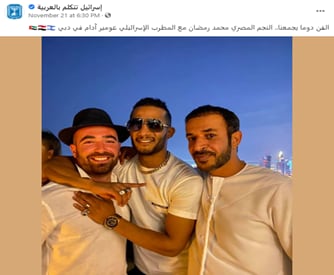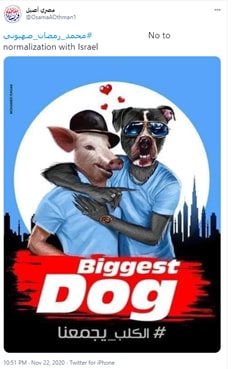Popular Egyptian actor and singer Mohamed Ramadan recently faced intense backlash after a photo snapped at a Dubai restaurant, showing him with his arm around Israeli singer Omer Adam, went viral on social media.[1] Many Egyptians condemned Ramadan and even accused him of treason, and a "Mohamed Ramadan Zionist" hashtag was launched on Twitter. The fury increased even further after the photo was published on the Israel Foreign Ministry's "Israel speaks Arabic" Facebook page, with many expressing hatred for Israel and accusing Ramadan of serving this country's aim of currying favor with the Egyptian people.[2]

Mohamed Ramadan (center) with Israeli singer Omer Adam (left) and Emirati media personality Hamad Al-Mazroui (right) on the Israeli Foreign Ministry's "Israel Speaks Arabic" Facebook page (Facebook.com/IsraelArabic, November 21, 2020.

Cartoon on Twitter depicts Ramadan as a dog and Adam as a pig (Twitter.com/OsamaAOthman1, November 22, 2020)
Media outlets identified with the Egyptian regime joined the social media attacks on Ramadan, publishing articles against him and demanding that he apologize for his action. For example, Hamdi Rizq, who is editor of the Egyptian daily Al-Masri Al-Yawm and is close to the Egyptian regime, called for Ramadan to apologize for "this act of normalization, the likes of which no celebrity before him has ever perpetrated."[3]Egyptian TV host Ahmed Moussa, also affiliated with the regime, attacked Ramadan on his television show, describing his action as a "disgrace" and urging the Union of Art Syndicates to take measures against him.[4] Professional syndicates in Egypt indeed took measures against the singer. Egypt's Theatrical Professions Syndicate condemned his action, stressing that "there is a difference between the official agreements, to which the Arab governments are committed, and the popular, cultural and artistic stance on the issue of normalization." Subsequently, the Union of Art Syndicates suspended Ramadan's membership pending an investigation of the incident.[5] Furthermore, the Journalists Syndicate prohibited publishing any news about him or photographs of him, and a program starring him, scheduled to be aired next month during Ramadan, was cancelled. In addition, Egyptian attorney Tareq Mahmoud filed a lawsuit against him for causing harm to the Egyptian people.[6]
Mohamed Ramadan defended his action by claiming that he did not know who Omer Adam was when posing for the photo. He stated in an Instagram video: "I don't know [all] the people I pose with. We are all human, and I never refuse anyone who asks to take a picture with me… I can't ask everyone who wants to take a picture with me about his nationality, skin color or appearance." Later he took down the video and tried to quell the anger against him by replacing his Facebook profile picture with a Palestinian flag, but this did not stem the media outrage.[7] After the Union of Art Syndicates suspended him, Ramadan published on his Facebook page an image of himself in Egyptian army uniform, and explained that, had he known Adam was an Israeli, he would have refused to be photographed with him.[8]
However, amid the attacks on Ramadan, some Egyptian politicians and intellectuals published articles condemning the uproar over the photo. They accused Ramadan's critics of hypocrisy and exaggeration, and wondered why his action was considered such a crime when Israel has official relations with Egypt that serve Egypt's interests. They also slammed the Union of Art Syndicates for suspending Ramadan's membership, claiming that this measure did not serve the homeland.
The following are translated excerpts from some of the articles condemning the outrage over the photo.
Journalist And Politician Osama Al-Ghazali Harb: Since When Is It A Crime To Greet An Israeli?
In his November 28, 2020 column in the Egyptian government daily Al-Ahram, senior journalist and politician Osama Al-Ghazali Harb came out against the attack on Ramadan and against the professional syndicates that played a central role in it, wondering why it was a crime to greet a citizen of a country that has official relations with Egypt. He wrote: "The recent uproar against the young artist Mohamed Ramadan, and the accusations of 'normalization' against him, which led the Union of Art Syndicates to suspend him, caused me profound shock and amazement. Firstly, what did Ramada's act of 'normalization' consist of? The man was dining in a restaurant in Dubai… when two Israeli singers [sic] recognized him, greeted him and snapped a few friendly photos with him.
"The incident was a chance encounter in a restaurant in an Arab country! This is the first time I've heard that greeting an Israeli constitutes normalization, and I wonder what one is meant to do in such a situation. Should [Ramadan] have run away and refused to say hello to the guy? And why would he refuse? Like all other young Egyptians of his age (32), he knows that Israel is a country that has official relations with Egypt and has an embassy and an ambassador in Egypt. [Besides,] he was born more than 20 years after the 1967 war and 15 years after the October [1973] War.
"Ramadan behaved spontaneously, as he does with all his fans, and he has said very honestly that he can't ask everyone who wants to be photographed with him to produce an identity card or passport. And yet three professional syndicates – of the actors, of music and of film – wanted to score points for patriotism at Ramadan's expense, which is certainly easier than producing a film, a play, or a song about the stolen rights of the Palestinian people.
"Even more amazing is that [this uproar over] Mohamed Ramadan is taking place while some Gulf states, [namely] the UAE and Bahrain, have normalized their relations with Israel, following Sudan and South Sudan [sic], and while Qatar and Oman also have active relations with it. Why, then, do the three unions not sever their relations with these countries and prevent them from [enjoying] their film, theater and music productions?..."[9]
Senior Journalist 'Abd Al-Mun'im Sa'id: Opposing Normalization Contravenes Egypt's Foreign Policy
In a November 29, 2020 article, Egyptian intellectual and journalist 'Abd Al-Mun'im Sa'id, board chairman of the Al-Masri Al-Yawm daily, who was appointed by Egyptian President 'Abd Al-Fattah Al-Sisi to the Egyptian Senate (the upper house of parliament), likewise condemned the attack on Ramadan and the perception that the Egyptian people oppose normalization with Israel. He wrote that Egypt did not normalize relations and make a "brave peace" with Israel under duress, but rather by choice and based on its interests. He too criticized the conduct of the professional syndicates, which he said was not in the best interests of the homeland. He wrote: "To the best of my recollection, it was our teacher [the journalist] Mohamed Hassanein Heikal who outlined the debate or the national controversy about normalization in Egypt, and later in other Arab countries, by saying, 'Governments have their own need [to normalize relations with Israel], but the peoples are free [not to do so],' [thus] making the distinction between the governments and peoples…
"[But] were our governments [really] acting under the pressure of circumstances when they signed a peace agreement with Israel? Was the October War just a mirage that did not cost the Hebrew state dearly and cause it to change its positions…? Was president Sadat's visit to Jerusalem, which created an atmosphere of negotiation conducive to [realizing] the Egyptian and Arab rights, just a [reckless] adventure? Was the liberation of the entire Sinai, from Al-Tor to Taba, and from Sharm Al-Sheikh to Ras Al-Esh, only a dream and not reality?... All these are known facts… So why is it that, when a prominent Egyptian artist appears… in a photograph alongside an Israeli, we see this as something profane and close to treason?
"And is it true that [opposing normalization] is the free choice of the people, as reflected by the conduct of the [Egyptian] syndicates?... And more importantly, is it reasonable [to criticize Ramadan so harshly] at this point in history, when we know very well how Egypt conducts itself in the east of the Mediterranean[10] and how other Arab countries have followed our lead with regard to relations with Israel?[11]… Did the Egyptian people choose [to oppose normalization] when factories in Egypt held demonstrations, demanding to be part of the QIZ (Qualified Industrial Zone) agreement, [signed by] Egypt, Israel and the U.S…. which gives priority to Egyptian merchandise and opens the gates of the large American market to it? Was this the popular position [in Egypt] with respect to Israeli tourists, including [both] Palestinian Arabs and Jews, who for years were counted among the foremost visitors [advancing tourism] to Egypt?
"No one disputes that Israel is an aggressive country which occupies the Palestinian territories, but boycotting [it] is part of a policy of sanctions and active participation in the liberation of the occupied land. It is not a matter for individual action on social media. [A boycott] is first and foremost a tool of states, not of civil organizations and [professional] syndicates, which have the right to express an opinion but not the right to make political decisions.
"The question is, why did we not see such outrage and opposition over the Russian or Turkish occupation of Syria, the Iranian occupation of Syria, Iraq, Lebanon and Yemen, or every time Saudi Arabia was targeted [by the Houthis]…?
"I have [never] heard any of Mohamed Ramadan's songs or watched any of his films or series. I share the musical tastes of my generation and of those who came shortly after… But I also belong to the generation that fought in October [1973] and [later] witnessed the brave peace [with Israel]. [This] generation has the self-confidence and national ability to convey to the younger generations that their music, their conduct and their international relations must be within the framework defined by the Egyptian state and by the only legitimate representatives [entitled] to speak on its behalf and on behalf of its interests… Denying the right of the state to conduct its own foreign policy, as some of us are doing [i.e. those who oppose normalization], does not, in any way, serve the interests of the homeland!"[12]
[1] It should be noted that on the same occasion Ramadan also posed with two other Israelis: Arab Israeli soccer player Diaa Sabia and reality TV star Elad Tsapani.
[2] Facebook.com/IsraelArabic, November 21, 2020.
[3] Al-Masri Al-Yawm (Egypt), November 23, 2020.
[4] Al-Masri Al-Yawm (Egypt), November 22, 2020.
[5] Elbalad.news, November 23, 2020.
[6] Al-Quds Al-Arabi (London), November 24, 2020; Raialyoum.com, November 24, 2020.
[7] Elbalad.news, November 23, 2020.
[8] Facebook.com/Ramadan, November 23, 2020.
[9] Al-Ahram (Egypt), November 28, 2020.
[10] The reference is to the establishment of the Cairo-based EastMed Gas Forum by Cyprus, Egypt, Greece, Israel, Italy, and Jordan.
[11] The reference is to the normalization agreements which the UAE, Bahrain and Sudan have signed with Israel.
[12] Al-Masri Al-Yawm (Egypt), November 29, 2020.




